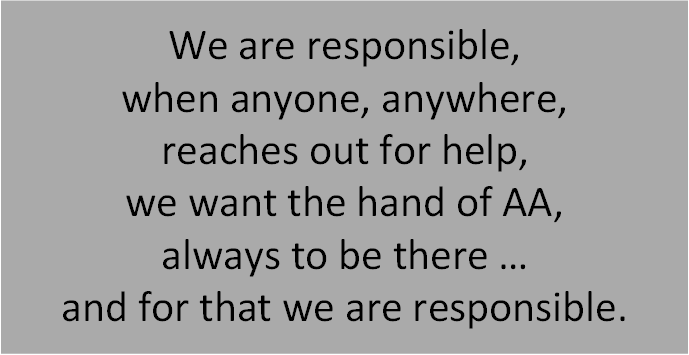While much has been written in A.A. literature about anonymity, including in a General Service Conference approved pamphlet called “Understanding Anonymity,” communications coming into the General Service Office from members of the Fellowship suggest that there remains a great deal of misunderstanding about this “spiritual foundation of all our Traditions.” What follows are just a few examples of the types of inquiries that arrive through phone calls, e-mails and letters, and some of the responses from A.A. literature.
Q. “We have a member who moved here from somewhere else and he is using his last name in meetings. What should we say to this person who is breaking the Tradition of anonymity?”
A. A.A. co-founder Bill W. wrote in The Language of the Heart (p. 15) that “It should be the privilege of each individual A.A. to cloak himself with as much personal anonymity as he desires. His fellow A.A.s should respect his wishes and help guard whatever status he wants to assume.” It is thus up to each individual to decide how anonymous he or she wishes to be, at any level below that of the public level. Giving your last name in an A.A. meeting
is not “breaking” A.A.’s Tradition of anonymity.
In fact, the author of an article in the February 1969 Grapevine magazine attributed the following to A.A.’s other co-founder, Dr. Bob, regarding personal anonymity and the Eleventh Tradition:
“Since our Tradition on anonymity designates the exact level where the line should be held, it must be obvious to everyone who can read and understand the English language that to maintain anonymity at any other level is definitely a violation of this Tradition.
“The A.A. who hides his identity from his fellow A.A. by using only a given name violates the Tradition just as much as the A.A. who permits his name to appear in the press in connection with matters pertaining to A.A.
“The former is maintaining his anonymity above the level of press, radio, and films, and the latter is maintaining his anonymity below the level of press, radio and films — whereas the Tradition states that we should maintain our anonymity at the level of press, radio, and films.” (Dr. Bob and the Good Oldtimers, pp. 264-65)
Q. “What if I see public figures at a meeting, such as an actor or actress, or the local chief of police?”
A. “Like everyone else, public figures should have the protection of anonymity to the extent that they desire it.” (“Understanding Anonymity,” p. 9)
Q. “I saw an ad in the paper for an A.A. group. It told where the group was meeting and everything. Shouldn’t you contact that group about breaking their anonymity at the public level?”
A. “Suppose a sick alcoholic never has the good fortune to meet an A.A. How is such a person going to find us? The search will be difficult if the local group thinks it should be anonymous, too. The (Eleventh) Tradition is talking about ‘personal anonymity,’ remember? Alcoholics will not be attracted to A.A. if they don’t know that it exists….” (“The Twelve Traditions Illustrated”)
 Q. “I’m not ashamed of my alcoholism and don’t feel any need to keep my A.A. membership a secret. In fact, I think that my story will be able to help lots of others. I think that I should be able to use my full name in my book (or television interview, blog, Web site, etc.) when I share my A.A. experience. Why should anyone else have a problem with that?”
Q. “I’m not ashamed of my alcoholism and don’t feel any need to keep my A.A. membership a secret. In fact, I think that my story will be able to help lots of others. I think that I should be able to use my full name in my book (or television interview, blog, Web site, etc.) when I share my A.A. experience. Why should anyone else have a problem with that?”
A. Disclosing your A.A. membership at the public level, in any publicly accessible medium, is considered a break of the A.A. Tradition of Anonymity. Bill W. wrote, in an article in The Best of the Grapevine, Volume 1, p. 278, “The old files at A.A. Headquarters reveal many scores of…experiences with broken anonymity. Most of them point up the same lessons. They tell us that we alcoholics are the biggest rationalizers in the world; that fortified
with the excuse we are doing great things for A.A. we can, through broken anonymity, resume our old and disastrous pursuit of personal power and prestige, public honors, and money — the same implacable urges that when frustrated once caused us to drink….”
Q. “Why do we say that ‘anonymity is the spiritual foundation of all of our Traditions?’”
A. “ . . . anonymity is real humility at work. It is an all pervading spiritual quality which today keynotes A.A. life everywhere. Moved by the spirit of anonymity, we try to give up our natural desires for personal distinction as A.A. members both among fellow alcoholics and before the general public. As we lay aside these very human aspirations, we believe that each of us takes part in the weaving of a protective mantle which covers our whole Society and under which we may grow and work in unity.” (Twelve Steps and Twelve Traditions, p. 187)
As published in News and Notes From the General Service Office of AA. ® Box 459 Vol. 58, No. 3 Fall 2012 www.aa.org



